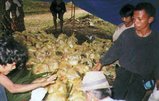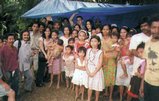

For 10 days straight, heavy rain pounded Banten province, western Java, an area of hills, plantations, and gold mines. Strong winds blew down houses and uprooted trees. Rivers overflowed their banks and washed away more houses. Mines flooded or collapsed, and miners were trapped. Over one hundred people are known to have died, and many more are still missing. But the trouble didn't stop when the storms did: Longstanding problems of poor nutrition and hygiene made the villagers in remote areas of the province especially susceptible to all types of infections, dengue fever, typhoid, and more. This is where our story begins. …
A good friend who is a medical doctor is leaving for Banten to help with the relief effort. She asks us to join her.
The night before our departure, we work into the night, putting together relief packages that we will deliver personally to the storm victims: rice, sugar, salt, oil, noodles, shampoo, snack foods, and a printed message of comfort and encouragement.
After a four-hour drive, we transfer some of our personnel and supplies to vehicles that are better suited to off-road conditions. At this point we are advised not to go on without a local guide. Although most of the population of Banten is Muslim, the area is also known for its black magic, witchcraft, and Jawara (a brutal local mafia).
The first villages we arrive at have already been reached with emergency aid, so we drive on. Our large team splits into three. We dropped two teams of doctors and medical students in areas where there's a big need for medical help. The rest of us, in two vehicles, go to a small hilltop where villagers who lost their homes to gale-force winds and mudslides have taken refuge. We find them living in makeshift huts of woven bamboo and coconut leaves, with mud floors—real mud!
Mud is everywhere, but these people are so thankful for our visit that everyone comes out to greet and thank us. We spend the rest of the day encouraging them and distributing the goods we had brought.
After an equally challenging 270 km (160 mi) trip home, we arrive dog-tired but very happy to have been able to share a little of God's love and blessings with those in need.